|
|
|
Sort Order |
|
|
|
Items / Page
|
|
|
|
|
|
|
| Srl | Item |
| 1 |
ID:
164068
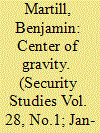

|
|
|
|
|
| Summary/Abstract |
Cold War strategy in Western Europe almost exclusively followed the US policy of containment. Conventional explanations for this continuity, however, fail to account for both the strategic rationale and the scale of domestic support behind attempts to disengage from the Cold War. This article seeks to explain why containment won out over disengagement in European strategy. By highlighting the underlying liberal tenets of containment, it argues this victory owed more to the advantages afforded the political center by the political institutions of Western Europe than to the logic of containment strategy itself. The occupation of the center-ground by advocates of containment afforded them distinct institutional advantages, including an increased likelihood of representation in government, greater bargaining strength relative to other parties, and limited sources of viable opposition. The dependence of containment strategy on centrist strength is demonstrated through a discussion of the politics of strategy in the French Fourth Republic.
|
|
|
|
|
|
|
|
|
|
|
|
|
|
|
|
| 2 |
ID:
109585
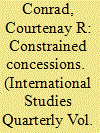

|
|
|
|
|
| Publication |
2011.
|
| Summary/Abstract |
Do domestic institutions affect how dictators respond to their political opposition? In this paper, I argue that institutionalization is key to understanding whether dictators respond to domestic opposition groups with concessions. I present a nominal typology of dictatorial opposition movements, arguing that the manner in which the opposition is incorporated into the regime reveals important information about the types of concessions dictators will likely provide. Using a system of endogenous equations, I show that dictators buy off some types of domestic opposition with material concessions and liberalize when they face other types of opposition. Because dictators often make decisions facing environmental constraints, however, I also argue that financial conditions can limit a dictator's ability to respond beneficently to the opposition.
|
|
|
|
|
|
|
|
|
|
|
|
|
|
|
|
| 3 |
ID:
074658
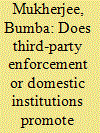

|
|
|
|
|
| Publication |
2006.
|
| Summary/Abstract |
What causes peaceful resolution of civil wars to endure rather than to collapse into renewed fighting? Existing studies predict that third-party peace enforcement by the United Nations (UN) or domestic institutions such as democracy, parliamentary, and presidential institutions and the proportional representation (PR) electoral system promotes enduring peace in societies that have emerged from a civil war. However, extant empirical works test the effect of third-party enforcement but not the impact of domestic institutions on peace after civil wars. Hence, I test the impact of democracy, presidential, and parliamentary institutions, electoral systems-PR and majoritarian-and third-party enforcement by the UN on the durability of peace after termination of civil wars. Results from a bootstrapped Weibull duration model show that democracy and the PR electoral system significantly reduces the likelihood that civil war may recur, but that third-party enforcement by the UN does not have a significant effect on the hazard rate of peace spells. A brief case study analysis of recent attempts to build democratic institutions in Cambodia and Kosovo by the international community also supports the claims posited in this article.
|
|
|
|
|
|
|
|
|
|
|
|
|
|
|
|
| 4 |
ID:
098097
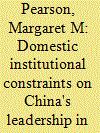

|
|
|
|
|
| Publication |
2010.
|
| Summary/Abstract |
The study of Chinese foreign policy has long shown that domestic politics and domestic constraints are sources of foreign policy, albeit generally considered less potent than ideology and interests. Domestic political constraints should also be explored as factors in Chinese regional policies toward East Asia, including regional economic institutions. This paper examines three domestic institutional constraints on regional foreign policy in the area of trade and economics: a fragmented decision-making structure that has difficulty with coordination, a relatively heavy reliance on top level decision-makers at a time when issues of Asian economic policy have relatively low priority for these same decision-makers, and the relatively extreme lack of autonomy for negotiators vis- -vis top decision-makers in Beijing. These constraints are by any means unique to China. However, at a time when many observers and participants are expecting-indeed, often hoping for-Chinese leadership in the region, the paper posits that these constraints hinder the PRC's ability to fill this role. The key empirical focus is regional trade agreements and regional economic organizations.
|
|
|
|
|
|
|
|
|
|
|
|
|
|
|
|
| 5 |
ID:
118176
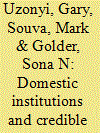

|
|
|
|
|
| Publication |
2012.
|
| Summary/Abstract |
Audience costs are a central feature of many prominent theories of international conflict. We advance the understanding of audience costs by specifying the domestic institutions necessary to generate them. In our conceptualization, audience cost capacity (ACC) is a function of the availability of alternative rulers and the cost of mobilizing against the incumbent. This conceptualization leads to the first measure of ACC that has variation between more and less democratic political systems and variation within autocracies. We subject our measure to a rigorous set of tests that includes addressing selection effects and temporal treatment effects, neither of which have been fully examined in this research area. The empirical analysis offers strong support for the validity of our measure.
|
|
|
|
|
|
|
|
|
|
|
|
|
|
|
|
| 6 |
ID:
109574
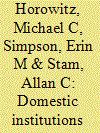

|
|
|
|
|
| Publication |
2011.
|
| Summary/Abstract |
Military leaders, policymakers, and academics have long debated the relative merits of volunteer versus conscript armies. They also have studied the possible effects of eroding resolve among mass publics in democratic states during wartime. In this paper, we use battlefield casualty data from the population of interstate wars to compare theories of property takings and domestic institutions. We find conscription, like other non-market-based property takings, to be a wasteful means of mobilizing military manpower. Volunteer armies suffer far fewer casualties than their conscripted counterparts. We also find that this effect compounds when interacted with regime type. Volunteer democratic armies suffer especially few casualties. Finally, we find that democratic societies are willing to bear the costs of large-scale commitments to maintaining state sovereignty and survival when targeted by authoritarian states, at times in the face of certain defeat.
|
|
|
|
|
|
|
|
|
|
|
|
|
|
|
|
| 7 |
ID:
072164
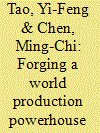

|
|
|
| 8 |
ID:
093789
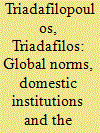

|
|
|
|
|
| Publication |
2010.
|
| Summary/Abstract |
This article examines the liberalisation of immigration policy in Canada and the US in the post-World War II era. I argue that shifting norms pertaining to race, ethnicity, and human rights cast longstanding discriminatory policies in Canada and the US in a highly critical light. Opponents of racially discriminatory immigration policies exploited this shift in normative contexts to highlight the disjuncture between Canada and the US' postwar commitments to liberal norms and human rights, on the one hand, and their extant policy regimes, on the other. The resulting pressure set in motion comparable processes of policy stretching and unravelling, which culminated in policy shifting in the mid-1960s. Policy shifting was, however, subject to very different political dynamics. Whereas Canada's institutional configuration granted the executive branch and bureaucracy a high degree of autonomy that enabled experimentation, the greater openness of the American political system led to a more politicised process, marked by compromises and deal-making. Thus while changing norms prompted the liberalisation of immigration policies in both countries, differences in their domestic political contexts resulted in very different admissions regimes.
|
|
|
|
|
|
|
|
|
|
|
|
|
|
|
|
| 9 |
ID:
139529


|
|
|
|
|
| Summary/Abstract |
This study examines the effect of domestic political change on United Nations General Assembly (UNGA) voting. We argue that foreign policy change is most likely when a new leader—one who relies on different societal groups for support than her predecessor—comes to power. We then examine the extent that domestic institutional context—in particular, democracy—shapes this process. We test our hypotheses using a new measure of UNGA voting patterns and new data on changes in leaders' supporting coalitions. We find that change in the societal support base of leaders leads to change in UN voting, especially in nondemocracies. This study lends credence to the perspective that foreign policy, like domestic policy, can vary with the particular interests that leaders represent; it encourages scholars to focus less on leadership change per se and more on changes in the societal groups to which leaders are most accountable. This study also suggests that democratic institutions inspire policy consistency not only in areas governed by treaties and international law, but also in areas of foreign policy that are easier to alter in the short term.
|
|
|
|
|
|
|
|
|
|
|
|
|
|
|
|
| 10 |
ID:
109584
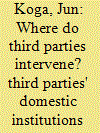

|
|
|
|
|
| Publication |
2011.
|
| Summary/Abstract |
Do democracies and autocracies intervene militarily in different types of civil conflict? In contrast to the existing literature that makes no distinction between military interventions undertaken by democracies and those by autocracies, I argue that democracies and autocracies are likely to intervene in different types of civil conflict. Specifically, I find that an increase in the rebel capabilities and the existence of an ethnic tie between the rebel group and the third-party state will increase the probability of a military intervention favoring the rebel group only when a third-party state is democratic. The evidence also shows that an autocracy is more likely to intervene when there are lootable natural resources such as secondary diamonds in a civil conflict, but there is no effect of lootable resources on a democracy's intervention decision. The analytical framework in this paper can apply to other types of military behaviors and would provide a more accurate picture of the effect of regime type on foreign policy choices.
|
|
|
|
|
|
|
|
|
|
|
|
|
|
|
|
|
|
|
|
|